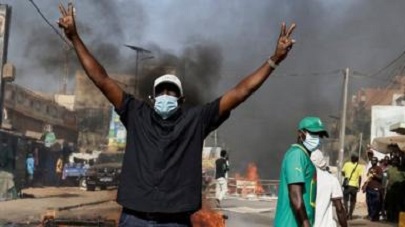Some residents tell the BBC they have been using wifi and Virtual Private Networks (VPN's) to bypass the curbs but not everyone is able to do this.
The opposition has condemned the shutdown of the signal of private television channel Walf TV for "incitement to violence" over its coverage of the demonstrations.
Two opposition politicians, including former Prime Minister Aminata Touré, once a close ally of President Sall but now one of his harshest critics, were both briefly detained following the protests.
Critics fear that this clampdown could plunge the country into further political turmoil which, by extension, could be dangerous for the whole West African region.
Satisfaction with democracy in Senegal has declined sharply under Mr Sall. In 2013 Afrobarometer, a pollster, found that after Mr Sall had taken office, more than two-thirds of Senegalese people were fairly or very satisfied with democracy. By 2022 less than half were.
However, Durmaz says he does not foresee the possibility of a military coup because Senegal has a "diverse range of political parties, a robust civil society and influential religious leaders who step in to mediate political disputes between the politicians".
Twenty candidates had made the final list to contest the elections, but several more were excluded by the Constitutional Council, the judicial body that determines whether candidates have met the conditions required to run.
Prominent among them were firebrand opposition leader Ousmane Sonko barred because of a libel conviction, and Karim Wade, the son of a former president, who was accused of having French nationality. They both say the cases against them are politically motivated.
Despite the delay, it is unlikely Mr Sonko will be able to participate in the election, as his party has already replaced him with Bassirou Faye who is also in jail but remains eligible to run, Mr Durmaz says.
Mr Sonko has shown that he is able to mobilise his supporters on to the streets and so while he remains barred, tensions are likely to stay high.
His banned Pastef party has vowed to push back against the delay, calling it a "serious threat to our democracy" and "contempt for the will of the people".
This is not the first time leading opposition candidates have been barred from running in presidential elections. Both Karim Wade and Khalifa Sall were jailed for corruption in 2015 and 2018 respectively, and barred from running in 2019.
This time, allegations of judicial corruption involving the Constitutional Council, brought by Karim Wade's party, prompted a parliamentary inquiry.
President Sall justified the election delay by saying time was needed to resolve the dispute that ensued between the Council and some members of parliament.
Despite the widespread anger over the delay, Mr Wade's Senegalese Democratic Party (PDS) has backed it, and if its MPs vote with the government, the bill could pass.
But Wole Ojewale, Dakar-based regional co-ordinator for Central Africa at the Institute for Security Studies, says the delay is not justified.
"The president is not in charge of the electoral process, and to the extent to which the electoral umpire has not raised doubts about their capacity to undertake the election. I don't think anything should derail the political process."
Mr Sall's critics suggest he may have feared his chosen successor, Prime Minister Amadou Ba, was in danger of losing the election.
"His [President Sall's] party is losing momentum. There are indications that they probably want to see how they can rejig, or probably replace their candidate," Ojewale says.
He says there is still a window to conduct the election as scheduled. Otherwise, the country may be plunged into widespread unrest, becoming a police state where civil liberties are eroded, a view Durmaz shares.
Ecowas and the African Union have called for dialogue. France, the US and the EU have all called for an election as soon as possible.
However, Durmaz says President Sall's international image would minimise any external pressure on him.
"I do not expect a firm push by Ecowas to reverse the postponement of the election in Senegal," he says, noting that the credibility of regional organisations such as Ecowas and the AU "has been significantly tarnished due to their inability to confront the democratic deficit in civilian-run countries".
All eyes will now be on the regional blocs to see how they treat yet another democratic headache in West Africa.





